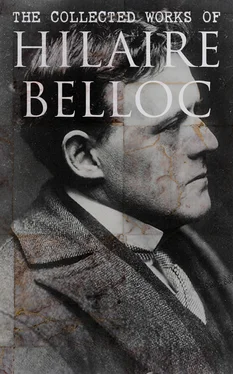Just at the time when Napoleon had determined thus to strike at the centre of the Prussian fine, Blucher, full of his recent successes upon his right and the partial recapture of the village of St. Amand, had withdrawn troops from that centre to pursue his advantage. It was the wrong moment. While Blucher was thus off with the bulk of his men towards St. Amand, the Old Guard, with the heavy cavalry of the Guard, and Milhaud’s cavalry as well—all Napoleon’s reserve—drew up opposite Ligny village for a final assault.
Nearly all the guns of the Guard and all those of the Fourth Corps crashed against the village to prepare the assault, and at this crisis of the battle, as though to emphasise its character, a heavy thunderstorm broke over the combatants, and at that late hour (it was near seven) darkened the evening sky.
It was to the noise and downpour of that storm that the assault was delivered, the Prussian centre forced, and Ligny taken.
When the clouds cleared, a little before sunset, this strongest veteran corps of Napoleon’s army had done the business. Ligny was carried and held. The Prussian formation, from a convex line, was now a line bent inwards at its centre and all but broken.
Blucher had rapidly returned from the right to meet the peril. He charged at the head of his Uhlans. The head of the French column of Guards reserved their fire until the horse was almost upon them; then, in volley after volley at a stone’s-throw range, they broke that cavalry, which, in their turn, the French cuirassiers charged as it fled and destroyed it. Blucher’s own horse was shot under him, the colonel of the Uhlans captured, the whole of the Prussian centre fell into disorder and was crushed confusedly back towards the Nivelles-Namur road.
Darkness fell, and nothing more could be accomplished. The field was won, indeed, but the Prussian army was still an organisation and a power. It had lost heavily in surrenders, flight, and fallen, but its main part was still organised. It was driven to retreat in the darkness, but remained ready, when time should serve, to reappear. It kept its order against the end of the French pressure throughout the last glimmer of twilight; and when darkness fell, the troops of Blucher, though in retreat, were in a retreat compact and orderly, and the bulk of his command was saved from the enemy and available for further action.
Thus ended the battle of Ligny, glorious for the Emperor, who had achieved so much success against great odds and after the hottest combat; but a failure of his full plan, for the host before him was still in existence: it was free to retreat in what direction, east or north, it might choose. The choice was made with immediate and conquering decision: the order passed in the darkness, “By Tilly on Wavre.” The Prussian staff had not lost its head under the blow of its defeat. It preserved a clear view of the campaign, with its remaining chances, and the then beaten army corps were concentrated upon a movement northwards. Word was sent to the fresh and unused Fourth Corps to join the other three at Wavre , and the march was begun which permitted Blucher, forty hours later, to come up on the flank of the French at Waterloo and destroy them.
Such had been the result of the long afternoon’s work upon the right-hand or eastern battlefield, that of Ligny, where Napoleon had been in personal command.
In spite of his appeals, no one had reached him from the western field, and the First Corps had only appeared in Napoleon’s neighbourhood to disappear again.
What had been happening on that western battlefield, three to four miles away, which had thus prevented some part at least of Ney’s army coming up upon the flank of the Prussians at Ligny, towards the end of the day, and inflicting upon Blucher a complete disaster?
What had happened was the slow, confused action known to history as the battle of Quatre Bras.
It will be remembered that Ney had been entrusted by Napoleon with the absolute and independent command of something less than half of his whole army. 7
He had put at his disposal the First and the Second Army Corps, under Erlon and Reille respectively—nearly 46,000 men; and to these he had added, by an afterthought, eight regiments of heavy cavalry, commanded by Kellerman.
The rôle of this force, in Napoleon’s intention, was simply to advance up the Brussels road, brushing before it towards the left or west, away from the Prussians, as it went, the outposts of that western half of the allied army, which Wellington commanded.
We have seen that Napoleon, who had certainly arrived quickly and half-unexpectedly at the point of junction between Wellington’s scattered forces and those of the Prussians, when he crossed the Sambre at Charleroi, overestimated his success. He thought his enemy had even less notice of his advance than that enemy really had; he thought that enemy had had less time to concentrate than he had really had. Napoleon therefore necessarily concluded that his enemy had concentrated to a less extent than he actually had.
That mistake had the effect, in the case of the army of the right, which he himself commanded, of bringing him up against not one Prussian army corps but three. This accident had not disconcerted him, for he hoped to turn it into a general disaster for the Prussians, and to take advantage of their unexpected concentration to accomplish their total ruin. But such a plan was dependent upon the left-hand or western army, that upon the Brussels road under Ney, not finding anything serious in front of it. Ney could spare men less easily if the Emperor’s calculation of the resistance likely to be found on the Brussels road should be wrong. It was wrong. That resistance was not slight but considerable, and Ney was not free to come to Napoleon’s aid. Tardy as had been the information conveyed to the Duke of Wellington, and grievously as the Duke of Wellington had misunderstood its importance, there was more in front of Ney upon the Brussels road than the Emperor had expected. What there was, however, might have been pushed back—after fairly heavy fighting it is true, but without any risk of failure—but for another factor in the situation, which was Ney’s own misjudgment and inertia.
Napoleon himself said later that his marshal was no longer the same man since the disasters of two years before; but even if Ney had been as alert as ever, misjudgment quite as much as lack of will must have entered into what he did. He had thought, as the Emperor had, that there would be hardly anything in front of him upon the Brussels road. But there was this difference between the two errors: Ney was on the spot, and could have found out with his cavalry scouts quite early on the morning of Friday the 16th what he really had to face. He preferred to take matters for granted, and he paid a heavy price. He thought that there was plenty of time for him to advance at his leisure; and, thinking this, he must have further concluded that to linger upon that part of the Brussels road which was nearest the Emperor’s forthcoming action to the east by Ligny would be good policy in case the Emperor should have need of him there.
On the night of the 15th Ney himself was at Frasnes, while the furthest of his detachments was no nearer than the bridge of Thuin over the Sambre, sixteen miles away. The rough sketch printed opposite will show how very long that line was, considering the nearness of the strategical point Quatre Bras, which it was his next business to occupy. The Second Army Corps under Reille was indeed fairly well moved up, and all in the neighbourhood of Gosselies by the night between Thursday 15th and Friday 16th of June. But the other half of the force, the First Army Corps under Erlon, was strung out over miles of road behind.
Читать дальше












